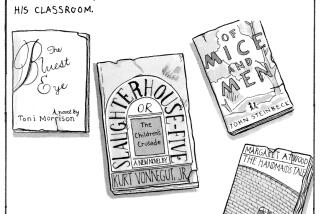Clinging to old classics can go hand in hand with banning books

- Share via
Too often, we forget that fights about what we shouldn’t read are also battles over what we should read. And that every time someone attempts to ban Toni Morrison or Ta-Nehisi Coates, they’re also trying to corral our kids back to Hawthorne and Hemingway, Dante and Dickens.
So perhaps it isn’t surprising that in the midst of a flood of book bans we’re also seeing a fresh effort to rally our forces to the defense of the classics. Hence, an article in the National Review claims that the great books are in need of a “massive salvage operation.” A recent piece in the Federalist calls for a renewed effort to “reclaim our Greco-Roman, Judeo-Christian heritage and enter again into the Great Conversation.” And, as if responding to a Florida politician fretting last year that the gadfly of Athens would be canceled, a professor at Columbia University has given us “Rescuing Socrates.”
Reading all this, you’d be forgiven if you thought the Western canon was on its last legs. Let me assure you that it isn’t.
I’m a humanities professor, and I teach big survey courses that used to be (and still sometimes are) filled exclusively with the dead, white, godly, men of Europe. And even as I try to diversify my own courses, to make room for other voices, I remain stunned at the extent to which these authors still both fill and structure the national conversation.
The best evidence comes from prominent and prestigious publications, which to this day give an astounding amount of space — or pixels, I suppose — to Western authors we’ve been writing about for centuries. So the most recent issue of Harper’s asks that we rethink Casanova. (Another article in the same magazine in the spring urges us to see W.H. Auden “in a new light.”) Just last week, the New York Times breathlessly reported breaking news from the field of Chaucer studies. And the October issue of the New Yorker claims that the 400-year-old John Donne is “more contemporary than ever.” And these are all from just the past month.
And we don’t just see the media’s preference for the canon in the content they cover. We see it in the way that canon structures their coverage.
This hit me most forcefully when I read an otherwise provocative article on literature produced by artificial intelligence. It ends with a series of pieces written by the AI at the request of the author in the style of a variety of well-known writers. But almost every one of them comes straight from an introductory English class taught in 1970: Homer, William Shakespeare, Philip Larkin, Sylvia Plath, Robert Frost, Emily Dickinson and George Orwell. Oh, and tokenistically, Langston Hughes.
We can detect this trend also in what culture writers assume their audiences know. So a thoughtful feature article in the New York Times Magazine this month on the contemporary poet Sharon Olds starts by comparing her to T.S. Eliot, Dickinson (again) and Wallace Stevens. That’s it. Again, the frame of reference is predominantly European, predominantly male and all white. And the implication is blazingly clear: These are the poets you need to know if you want to know poetry. (It’s easy to find analogous examples from the fields of art, music and film.)
In continuing to privilege the old classics, journalists make it easier to dismiss other voices as less important, more discardable — all of which plays right into the hands of the book-banning movement. And even without book banning, the standbys we’ve been reading forever still take up too much of the available room. If we keep centering the old canon, what should enter a new canon may die of asphyxiation.
So let’s stop trying to rescue Socrates. And Shakespeare, Chaucer, Homer and Proust. Believe me: They’re doing just fine.
Joshua Pederson is an associate professor of humanities at Boston University and the author of “Sin Sick: Moral Injury in War and Literature.” @joshua_pederson
More to Read
A cure for the common opinion
Get thought-provoking perspectives with our weekly newsletter.
You may occasionally receive promotional content from the Los Angeles Times.









